Are you curious about kombu vs nori? Look no further! In this article, we’ll explore these seaweed varieties’ flavor profiles, textures, and culinary uses.
You’ll also discover their nutritional benefits and handy tips for buying and storing both types.
So, whether you’re a seasoned seaweed enthusiast or new to ocean greens, get ready to dive into the fascinating world of kombu and nori.
Key Takeaways
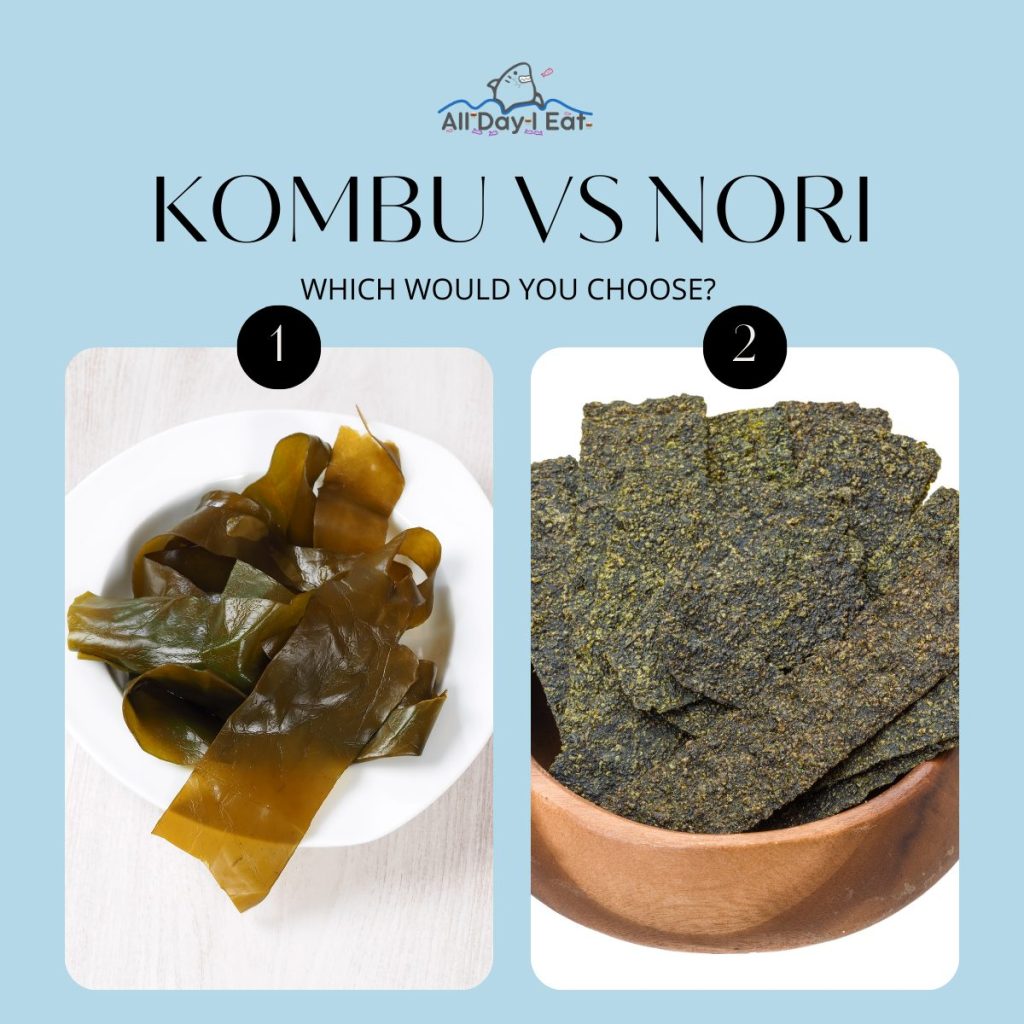
- Kombu is thick and smooth with a robust flavor while Nori is thinner and has a delicate flavor, making it perfect for sushi wrapping.
- Kombu and nori are edible sea vegetables from different types of algae
- Kombu is a thick, smooth kelp with a strong flavor, used for dashi and stews
- Nori is a thin, crisp seaweed with a mild flavor, used for sushi and snacks
- Kombu has more calcium, iron, and iodine, while nori has more protein and vitamin C
Kombu vs Nori: Flavor Profile
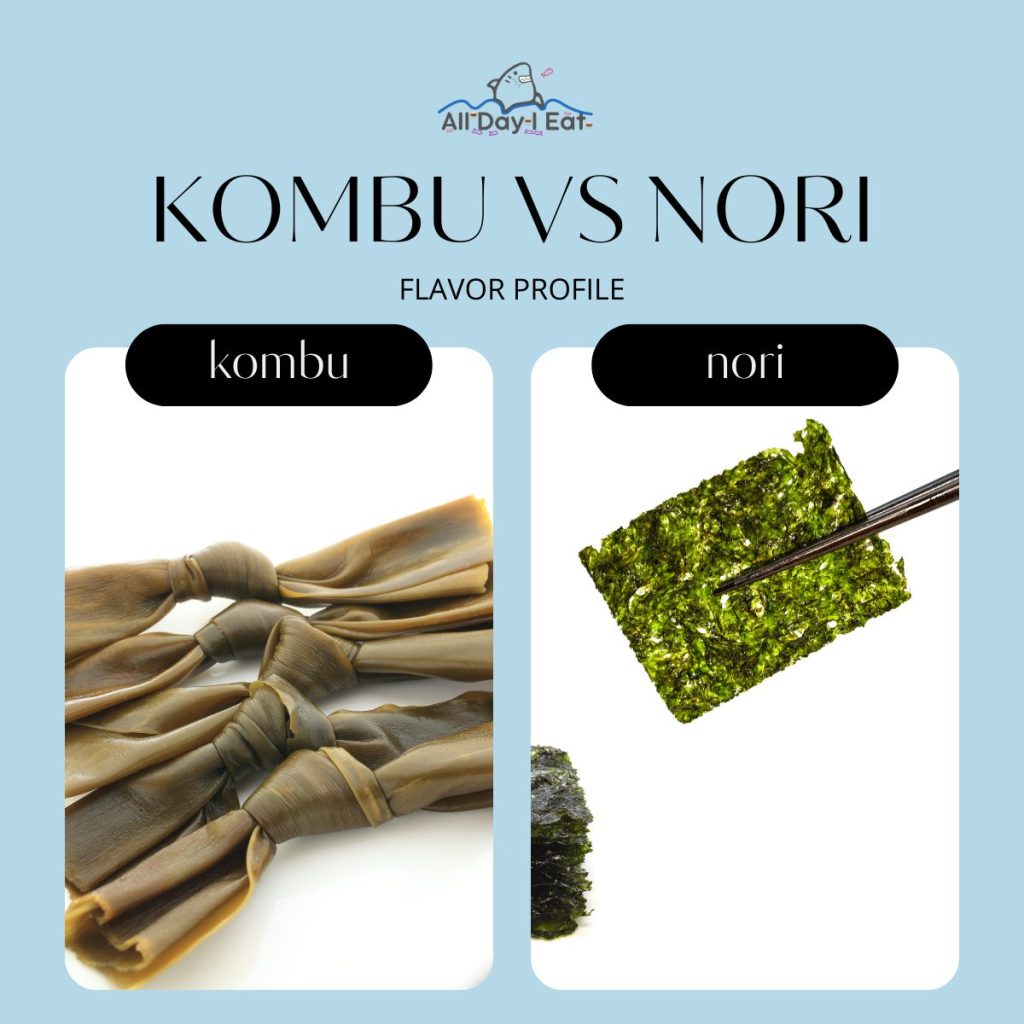
When comparing kombu vs nori, you’ll notice that they have distinct flavor profiles that set them apart.
Kombu, a type of kelp, has a savory and rich taste often described as umami. It adds depth and complexity to dishes, making it a popular choice for soups and stocks. Kombu also imparts a slightly sweet and briny flavor, enhancing the dish’s overall taste.
On the other hand, nori, a type of seaweed, has a more subtle and delicate taste. It’s often described as slightly nutty and has a hint of oceanic saltiness. Nori is commonly used to wrap sushi rolls, providing a unique texture and mild flavor.


Understanding the distinct flavor profiles of kombu vs nori can help you choose the right ingredient to enhance your culinary creations.
Kombu vs Nori: Texture and Appearance

Let’s explore their texture and appearance to continue comparing kombu vs nori. Both kombu and nori have distinct textures and appearances that contribute to their unique characteristics.
Kombu is a type of kelp that is thick, leathery, and slightly rubbery when cooked. It is typically dark brown or black and has a wrinkled appearance.
Nori, on the other hand, is a type of paper-thin and delicate seaweed. When toasted, it has a smooth and crisp texture and is usually dark green or purplish-black in color.


To summarize the differences in texture and appearance, refer to the table below:
| Characteristic | Kombu | Nori |
|---|---|---|
| Texture | Thick, leathery, slightly rubbery | Thin, delicate, smooth and crisp when toasted |
| Appearance | Dark brown or black, wrinkled | Dark green or purplish-black |
Understanding the texture and appearance of kombu vs nori can help you choose the right seaweed for your culinary creations.
Kombu vs Nori: Culinary Uses
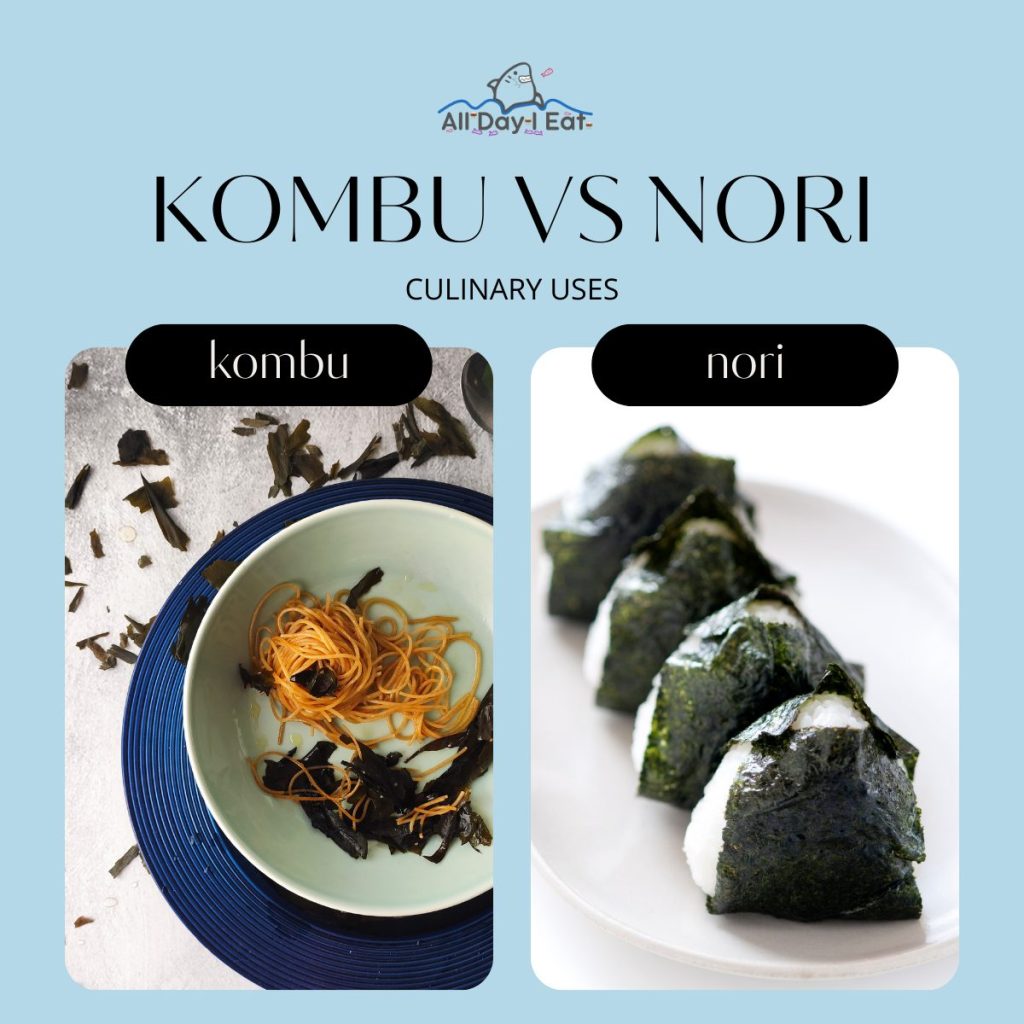
Now, let’s delve into the culinary uses of kombu vs nori, exploring how these seaweeds can be incorporated into your cooking.
Kombu
- Used in making dashi, a traditional Japanese broth.
- Added to soups, stews, and stocks to enhance flavor and impart umami.
Nori
- Popularly used as a wrapper for sushi rolls.
- Crumbled and sprinkled on rice dishes, salads, or soups for added texture and flavor.
Both kombu and nori can be used to make seaweed salads, providing a refreshing and nutritious side dish. You can also use kombu to make pickles, while you can toast nori and enjoy it as a crispy snack.


Additionally, both seaweeds can be used as a seasoning by grinding them into a powder and sprinkling it over dishes. Incorporating these seaweeds into your cooking not only adds a unique taste but also boosts the nutritional value of your meals.
Kombu vs Nori: Nutritional Benefits
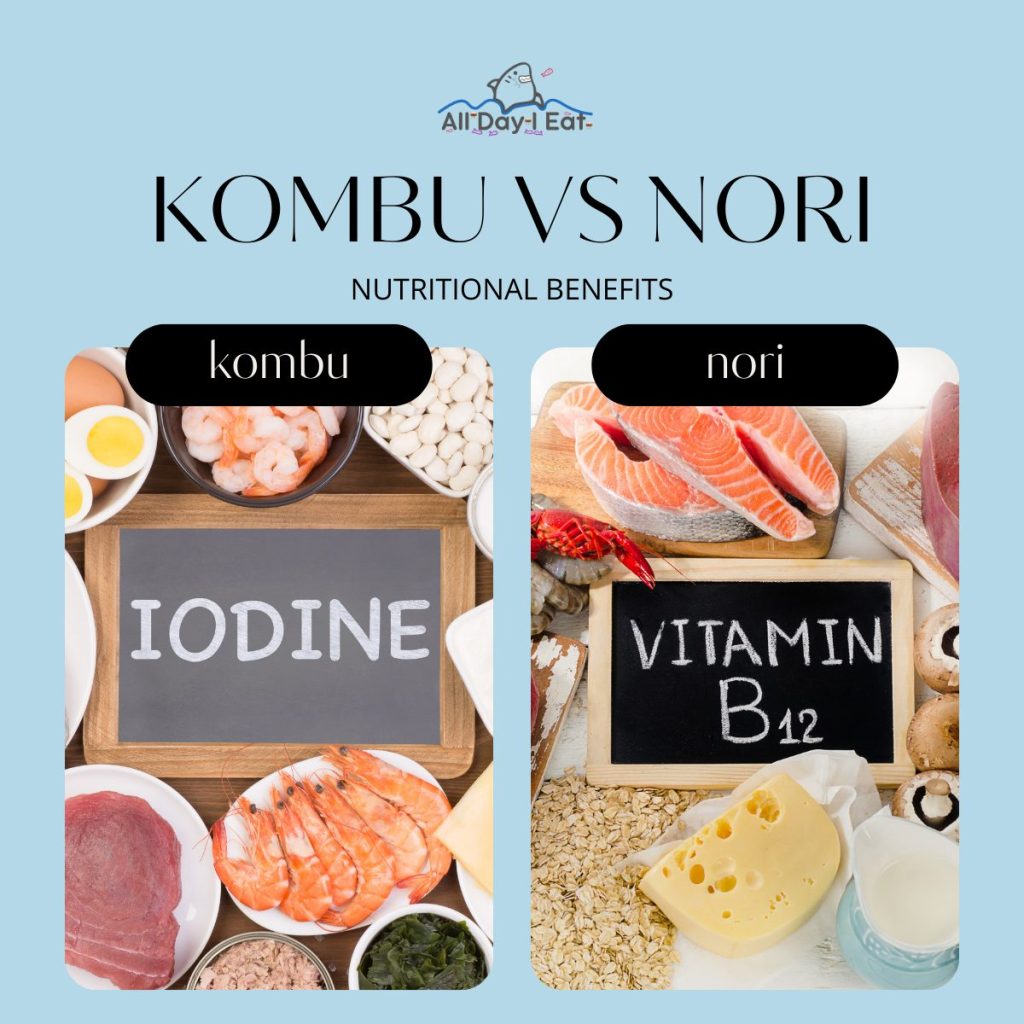
To understand the nutritional benefits of kombu and nori, you can examine the unique qualities each seaweed brings to your diet.
Kombu is a type of kelp rich in iodine, essential for thyroid function and metabolism. It also contains high levels of vitamins A, C, and E, antioxidants that help protect your cells from damage. Additionally, kombu is a great source of minerals like calcium, magnesium, and potassium, which are important for bone health and nerve function.
On the other hand, nori is packed with protein, making it an excellent choice for vegetarians and vegans. It’s also a good source of vitamins B12 and K, crucial for energy production and blood clotting.
Both kombu and nori provide dietary fiber, aiding digestion and promoting a healthy gut. Incorporating these seaweeds into your diet can enhance your overall nutritional intake.
Kombu vs Nori: Buying and Storing Tips
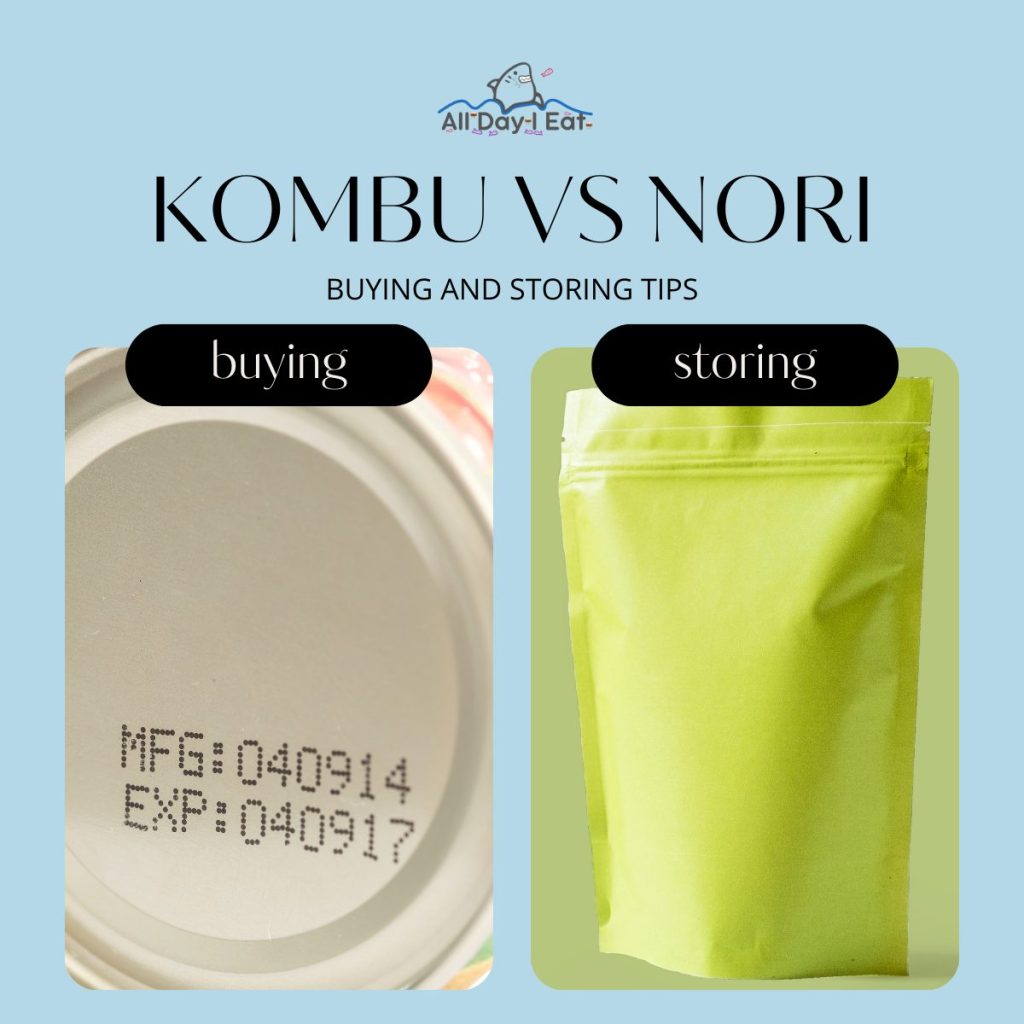
When buying and storing kombu and nori, keeping a few key tips in mind is important. Here are some helpful suggestions to ensure that you get the most out of your purchase:
Buying Tips
- Look for kombu and nori packaged in airtight containers or bags to maintain freshness.
- Check the expiration date to ensure the seaweed remains within its prime.



Konnichiwa! (Hello!) I'm Pat Tokuyama, a Japanese tofu cookbook author, who travels for music, food, and adventure. If you like Japanese tea, checkout some of the newestorganic japanese tea, matcha bowls and noren and more!
** Curious about the Plant Based Japanese Cooking Club? ** Learn more here!
Storing Tips
- Store kombu and nori in a cool, dry place, away from direct sunlight and moisture.
- Once opened, transfer the seaweed to an airtight container or resealable bag to prevent exposure to air and maintain its crispness.




Konnichiwa! (Hello!) I'm Pat Tokuyama, a Japanese tofu cookbook author, who travels for music, food, and adventure. If you like Japanese tea, checkout some of the newestorganic japanese tea, matcha bowls and noren and more!
** Curious about the Plant Based Japanese Cooking Club? ** Learn more here!